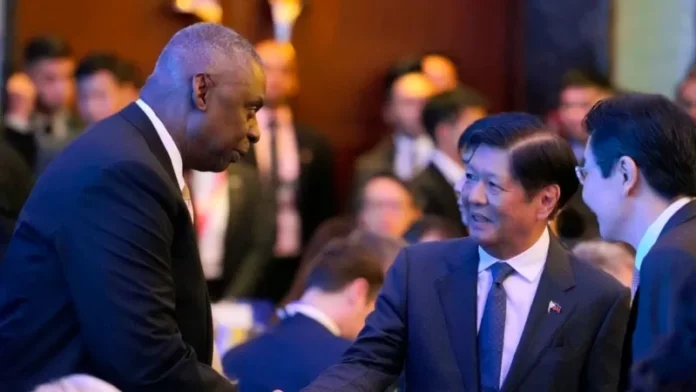Singapore – U.S. Defense Secretary Lloyd Austin recently addressed concerns about America’s focus on conflicts in Ukraine and Gaza, emphasizing the importance of refocusing attention on the threat posed by China in the Asia-Pacific region. Speaking at the annual Shangri-La Dialogue security summit in Singapore, Austin met with his Chinese counterpart, Dong Jun, in an effort to ease tensions over issues such as Taiwan and China’s military activities in the South China Sea.
Despite ongoing conflicts in other parts of the world, Austin made it clear that the Indo-Pacific remains a top priority for the United States. “Let me be clear: The United States can only be secure if Asia is secure,” he stated. “That’s why we have maintained a strong presence in this region for so long.” Austin also emphasized the importance of alliances in the region and the need for peaceful resolution of disputes through dialogue, not coercion or conflict.
In response, Chinese Lieutenant General Jing Jianfeng accused the U.S. of trying to create division and provoke confrontation in the region. He claimed that the U.S. Indo-Pacific strategy only serves its own selfish interests and goes against the shared aspirations of regional countries for peace and cooperation. However, Austin’s speech focused on China’s actions in the region, including its aggressive behavior in the South China Sea, without directly naming the country.
The U.S. has become increasingly concerned about China’s actions in recent years, with Beijing launching “punishment” drills and sending heavily armed warplanes to intimidate Taiwan. In response, the U.S. has allocated $8 billion in funding to counter China in the Indo-Pacific as part of a supplemental funding bill. This highlights the seriousness with which the U.S. views China’s actions and its commitment to maintaining stability in the region.
During the summit, Philippine President Ferdinand R. Marcos Jr. also spoke out against China’s illegal and coercive actions in the South China Sea. The Philippines, with its strong ties to the U.S. and close proximity to China, has become a key player in the power struggle between the two countries. Austin reiterated that the U.S.’s mutual defense treaty with the Philippines is iron-clad and that the aim is to prevent tensions from escalating.
Austin’s speech also addressed the need for dialogue and consultation to resolve disagreements between neighboring countries, rather than inviting conflict and instability. He emphasized that the U.S. will continue to play a vital role in the Indo-Pacific, working together with its allies to ensure peace and security in the region. However, Jing, the Chinese general, argued that these alliances only contribute to instability and called for disputes to be resolved through dialogue and consultation.
As tensions continue to rise in the region, it is crucial for countries to work together to maintain peace and stability. The U.S. has long been a key player in the Asia-Pacific, and its commitment to the region remains strong. Through alliances and partnerships, the U.S. will continue to play a vital role in ensuring the security and prosperity of the Indo-Pacific.
In conclusion, Austin’s speech at the Shangri-La Dialogue reaffirmed the U.S.’s commitment to the Indo-Pacific and highlighted the importance of addressing the threat posed by China in the region. The U.S. will continue to work with its allies to promote peace and stability and resolve disputes through dialogue and consultation. As the world watches the developments in the Asia-Pacific, it is clear that the U.S. remains a strong and reliable partner in the region.

